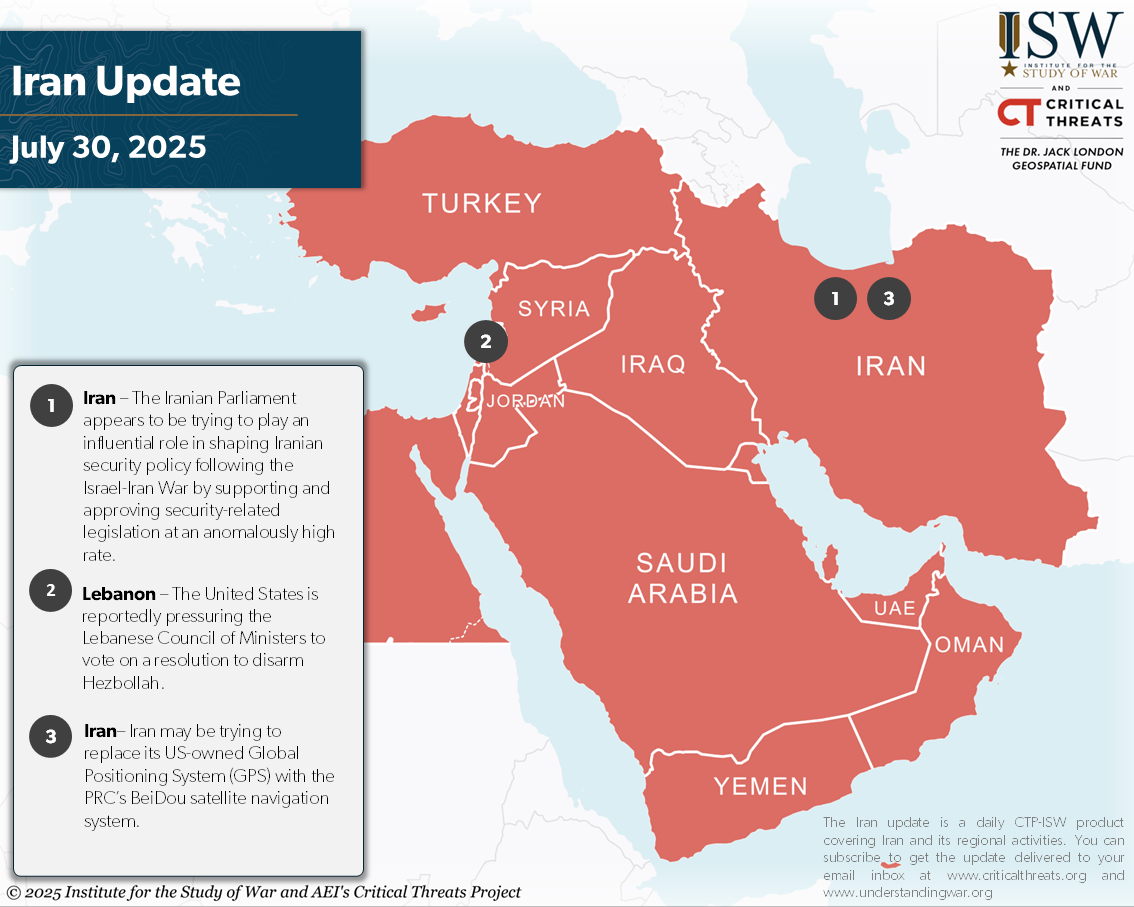The Iranian Parliament appears to be trying to play an influential role in shaping Iranian security policy following the Israel-Iran War by supporting and approving security-related legislation at an anomalously high rate. Parliament recently approved a bill on July 27 that would further expand the regime’s ability to suppress public dissent. The bill targets unspecified “fake news” on social media and only applies to social media accounts with over 90,000 followers. The regime could define anti-regime statements or unapproved narratives as “fake news” to suppress regime dissidents. The "fake news“ bill is the latest of several security-related pieces of legislation that Parliament has approved since the conclusion of the war, which is consistent with the regime’s efforts to securitize Iranian society following the war. Parliament approved an espionage bill on June 29 that targets suspected spies or individuals aiding hostile states. The regime could use the espionage bill to target any Iranian who opposes the regime, similar to the "fake news” bill. The Guardian Council still needs to approve the espionage bill in order for it to become law. Parliament separately passed a bill on July 2 to suspend Iranian cooperation with the International Atomic Energy Agency (IAEA), which could undermine moderate pro-negotiations officials’ ability to comply with foreign demands for Iran to cooperate with the IAEA. The Iranian Parliament regularly passes legislation, including legislation related to security, but the rate at which it has done so following the war is anomalous and may reflect Parliament’s efforts to play a more significant role in shaping Iranian security policy.
Iranian President Masoud Pezeshkian’s cabinet withdrew the “fake news” bill from Parliament on July 30, which highlights the fissures between moderate and hardliner elements in the Iranian political sphere. The decision to withdraw the bill may also reflect government concerns that the legislation could trigger popular unrest. Pezeskhian’s cabinet withdrew the bill to maintain "national unity,” according to the Iranian government spokesperson. The Government Information Council head separately stated that Pezeshkian’s cabinet withdrew the bill in order to avoid causing "concern and discomfort” to the Iranian people. The decision comes after the justice minister, legal experts, and civil society members reviewed the bill on July 30 upon Pezeshkian’s request and amid criticism from reformist and moderate factions that the bill would further erode trust between the regime and the Iranian people. Iranian hardliners, who comprise the majority of Parliament, will likely oppose Pezeshkian’s decision to withdraw the bill.
The United States is reportedly pressuring the Lebanese Council of Ministers to vote on a resolution to disarm Hezbollah. The United States and Lebanon have exchanged multiple proposals to disarm Hezbollah during ongoing negotiations over the past six weeks but have unable not been able to reach an agreement. The Lebanese government gave US Special Envoy Thomas Barrack an updated proposal during his visit to Beirut in early July, which Israel rejected. Five unspecified sources told Reuters on July 29 that the United States will no longer engage in direct negotiations or “pressure Israel” to stop operations in Lebanon until the Lebanese Council of Ministers votes on a resolution that commits the Lebanese government to disarming Hezbollah. The 24-member Council of Ministers is Lebanon’s executive body that sets and implements the Lebanese government’s policies. A council decision would make Hezbollah’s disarmament Lebanese state policy and publicly affirm the government’s commitment to do so. Unspecified political sources told Lebanese media that French President Emmanuel Macron advised Salam to hold a council session to pass a resolution to monopolize the state’s arms during their July 24 meeting.
Key Takeaways:
- Iranian Securitization Efforts: The Iranian Parliament appears to be trying to play an influential role in shaping Iranian security policy following the Israel-Iran War by supporting and approving security-related legislation at an anomalously high rate. This legislation includes a bill that Parliament approved on July 27 that would further expand the regime’s ability to suppress public dissent. Iranian President Masoud Pezeshkian’s cabinet withdrew this bill from Parliament on July 30, which highlights the fissures between moderate and hardliner elements in the Iranian regime.
- Hezbollah Disarmament: The United States is reportedly pressuring the Lebanese Council of Ministers to vote on a resolution to disarm Hezbollah. Lebanese Prime Minister Nawaf Salam is attempting to obtain support for a disarmament resolution from Hezbollah and the Amal Movement before convening the council for a vote, which will likely further stall US-Lebanon negotiations given that Hezbollah continues to refuse to disarm.
- Iran-China Military Cooperation: Iran may be trying to replace its US-owned Global Positioning System (GPS) with the PRC’s BeiDou satellite navigation system. Iran’s interest in BeiDou is part of a broader increase in Iranian military and defense cooperation with the PRC following the war.
| 




 [ISW] 러시아 점령 업데이트, 2025년 7월 31일
[ISW] 러시아 점령 업데이트, 2025년 7월 31일